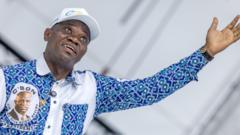The atmosphere in Libreville, Gabon’s capital, suggests a strong favoritism towards Oligui Nguema, whose campaign posters overwhelmingly dominate the cityscape as he prepares for the election. With many citizens indicating their intent to vote for him, he embodies a symbol of change. His message of action over rhetoric resonates strongly with some voters, reinforcing their hopes for a brighter future under his leadership.
However, while some Gabonese express support, others, such as 30-year-old Shonnys Akoulatele, harbor reservations about the candidates on offer. "We're merely seeing a monotony of the previous regime," she points out, highlighting a pervasive disillusionment with the election. The predominant candidates, many of whom have historical ties to former President Ali Bongo, do not instill enough confidence for transformative change.
Oligui Nguema himself has positioned his leadership as antithetical to the past, emphasizing his anti-corruption stance and pledges to revive the nation’s economic prospects. Yet, political analysts express concerns about the authenticity of this purported renewal, noting that many current officials were former allies of the Bongo dynasty.
As the nation prepares for what many hope will be a definitive pivot away from Bongo’s influence, critics of Nguema argue that the new electoral frameworks are crafted to benefit him, potentially undermining the genuine democratic process. The overarching narrative, however, remains mixed; supporters herald him as a liberator, while skeptics call for real change and accountability. This election is a pivotal moment for Gabon, representing a possible turning point in a history marked by longstanding autocracy.
However, while some Gabonese express support, others, such as 30-year-old Shonnys Akoulatele, harbor reservations about the candidates on offer. "We're merely seeing a monotony of the previous regime," she points out, highlighting a pervasive disillusionment with the election. The predominant candidates, many of whom have historical ties to former President Ali Bongo, do not instill enough confidence for transformative change.
Oligui Nguema himself has positioned his leadership as antithetical to the past, emphasizing his anti-corruption stance and pledges to revive the nation’s economic prospects. Yet, political analysts express concerns about the authenticity of this purported renewal, noting that many current officials were former allies of the Bongo dynasty.
As the nation prepares for what many hope will be a definitive pivot away from Bongo’s influence, critics of Nguema argue that the new electoral frameworks are crafted to benefit him, potentially undermining the genuine democratic process. The overarching narrative, however, remains mixed; supporters herald him as a liberator, while skeptics call for real change and accountability. This election is a pivotal moment for Gabon, representing a possible turning point in a history marked by longstanding autocracy.


















